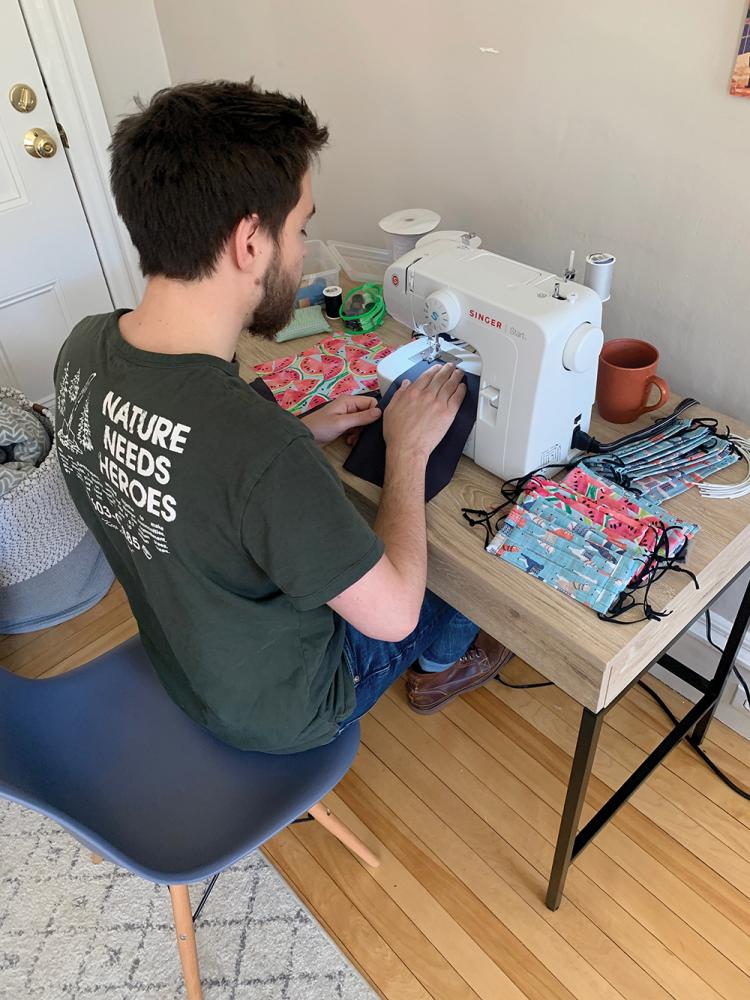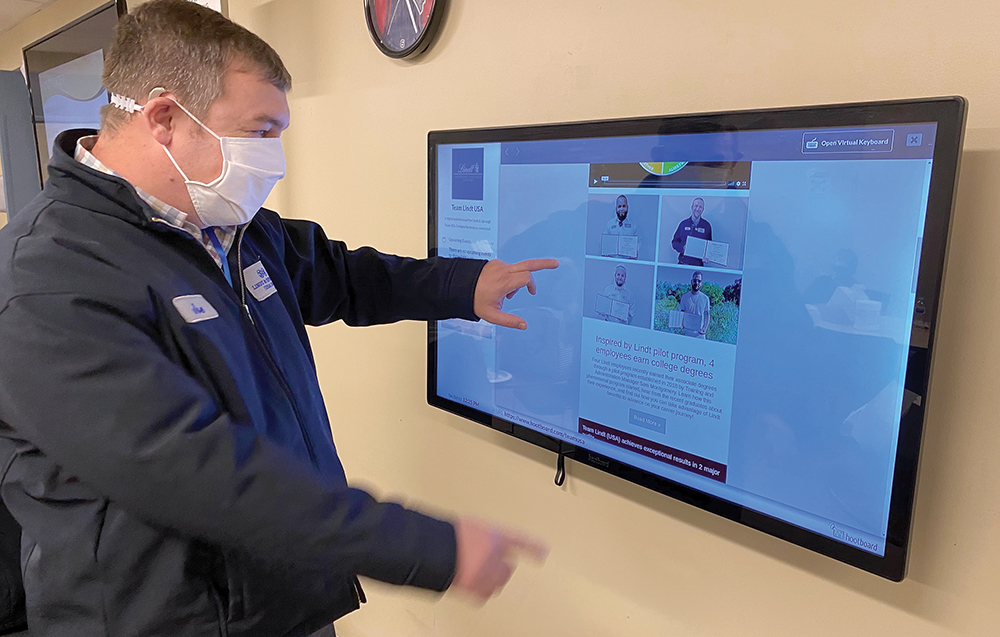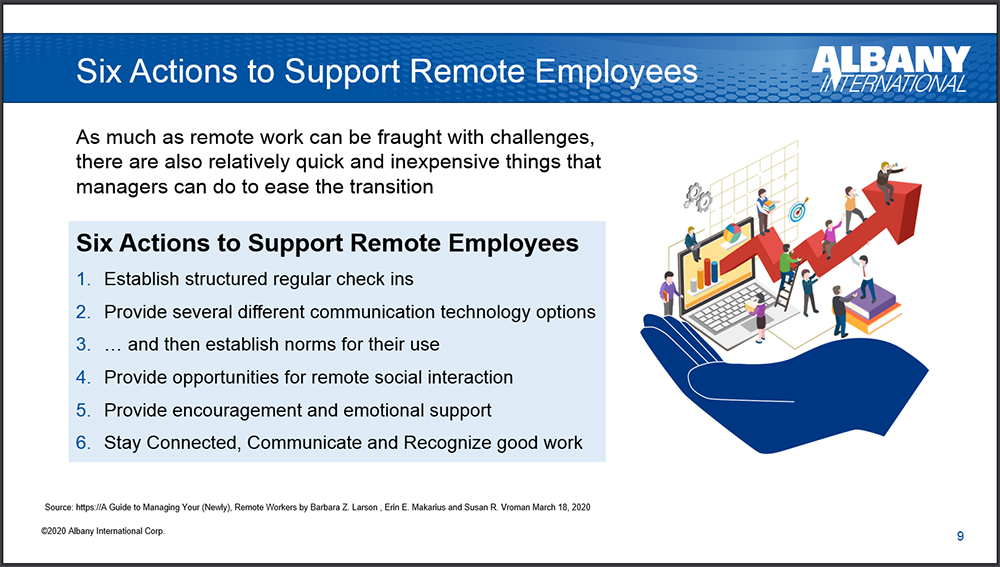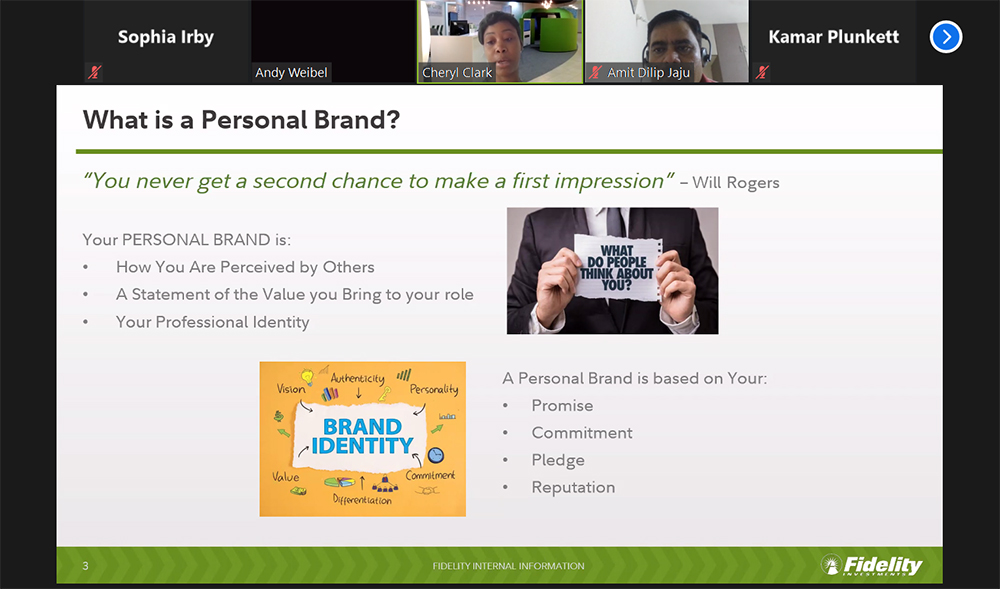
McLane Middleton’s wellness committee has continued its hiking challenge during the pandemic. Courtesy photo.
As employees continue to slog through months of working from home or adapt to being back at the workplace with social distancing and masks, professional development has not been exactly top of mind.
That doesn’t mean it isn’t happening. Like everything else in this pandemic, it’s just being done differently. Training that was once provided in classrooms or over lunch has gone virtual. And a slate of new programs has emerged that are less focused on professional development and more geared to helping employees cope with everything from increased stress to managing kids learning from home.
“The reality is that many people are balancing parenting, caretaking, mental health and other related challenges while also balancing work during this difficult time,” says Victoria Leitz, director and HR business partner at footwear manufacturer Timberland in Stratham. “As such, Timberland has shifted our learning and development focus toward how we can support and ensure the safety of our workforce during this time.”
Timberland is not alone. Many NH companies are taking a holistic approach to professional development, offering online versions of courses that enhance worker skills while also taking steps to ensure those workers stay safe, healthy and sane.
McLane Middleton
McLane Middleton, NH’s largest law firm with 230 employees, has traditionally offered its legal professionals monthly lunch and learn sessions on topics ranging from dressing for success to what potential clients look for in a law firm, says CEO and Executive Director Cathleen A. Schmidt. Departments have also held their own lunches to discuss cases lawyers are working on and to share best practices.

An educational webinar presented by McLane Middleton. Courtesy photo.
Post-pandemic, the locales and the themes of those sessions have changed, according to Schmidt, with online bring-your-own lunch sessions focused on such topics as how to look your best on Zoom, how to set up a virtual background and how to do business development in a virtual world. The in-person conferences McLane Middleton used to host for clients on a variety of topics have also morphed into educational webinars on subjects like the federal CARES Act (Coronavirus Aid, Relief and Economic Security), the legislation that provided economic relief for workers and small businesses.
To provide the socialization once enjoyed during traditional professional development sessions, the firm has set up pods of eight to nine members who communicate regularly “as a way to get to know each other as colleagues,” says Schmidt. McLane also hosts biweekly phone calls “celebrating success and hearing stories with all 200 colleagues,” she says. “That’s been a real game-changer, and I think we’ll continue it.”
In addition, reminders about the employee assistance program, which offers free help for those dealing with life challenges, are more frequent. The firm’s wellness committee is also continuing a hiking challenge and a parent affinity group meets once a month to help working parents cope.
Timberland
Timberland has always provided employees with a variety of classroom and on-demand learning opportunities through its learning management system, says Leitz. Subjects range from strengthening communication skills to building multi-cultural relationships to developing business acumen.
“Through the pandemic, the need for self-guided and on-demand learning became even more critical,” she says.
The company also provided managers with information biweekly on such topics as finding a balance and active listening in a virtual environment to help them in conversations with associates. Timberland also requires them to attend workshops on leading with empathy.
An internal network for working parents coping with kids going back to school provides virtual parent meet-ups and focus groups offering tips and ideas for balancing home schooling.
 Timberland also launched two initiatives as a result of the pandemic: an eight-week digital summer school to help workers gain a better understanding of digital marketing, and a “gigs” talent program that allows workers to explore interests that may be outside their day-job descriptions. Leitz says the program “allows our associates to explore their passions and interests in support of their career and development journey.” For example, she says, someone working in finance may be interested in social media. Through the program, he or she could take a “gig” designing digital content for Timberland during regular working hours.
Timberland also launched two initiatives as a result of the pandemic: an eight-week digital summer school to help workers gain a better understanding of digital marketing, and a “gigs” talent program that allows workers to explore interests that may be outside their day-job descriptions. Leitz says the program “allows our associates to explore their passions and interests in support of their career and development journey.” For example, she says, someone working in finance may be interested in social media. Through the program, he or she could take a “gig” designing digital content for Timberland during regular working hours.
Timberland also encourages employees to serve the community through things like sewing masks, making cards and pictures for veterans, food shopping for the elderly and building window boxes for neighbors who can’t get outside.

During COVID-19, Timberland employees used their Path of Service hours to sew masks for organizations and community members in need. Courtesy photo.
Lindt USA
Chocolate maker Lindt USA in Stratham has a long-standing benefit providing 100% college tuition reimbursement, as well as a combination of traditional and virtual classroom training, says Lisa Cloutier, vice president of human relations.
Since the pandemic, tuition reimbursement is still offered, and traditional classroom training has been adapted to an online format. Available virtual training ranges from a “chocolate essentials” program to classes on communication, leadership and coaching, and project management.
Lindt USA is also partnering with its global HR team to increase the number of online professional skills training classes for employees company-wide and is now piloting a new platform with 150 corporate and factory employees, Cloutier says. The company plans to expand the offering in early 2021, she says. It has also developed three- to four-minute training videos to help employees navigate online meetings, work from home and understand new safety protocols.
Lindt’s “management essentials” training program includes online workshops on such topics as recruiting for success and helping employees realize their full potential, Cloutier says.

Lindt USA employee Joe Wentworth uses a smart TV in the breakroom to review the company’s latest newsletter. Courtesy photo.
She adds that the company has been using its biweekly online newsletter and smart TVs located throughout the factory to encourage employees to reach out if they need help managing stress, and also provides a free employee assistance program.
“Almost immediately after COVID hit in March, our senior team began placing even more focus on increased communication with our leaders through weekly, then biweekly, calls,” Cloutier says. “We use these calls to help leaders to pivot and adjust their style to this ‘new normal’ as best as they can. We emphasize empathy and increased team engagement to help our employees continue to thrive personally and professionally in these challenging times.”
Albany International
As part of its response to the pandemic, Albany International, a composite materials manufacturer in Rochester with 4,600 employees worldwide (300 in NH), launched training for leaders on the importance of communicating regularly with their employees, emphasizing the importance of patience, as at-home workers might have children home from school and pets interrupting their day, says Alice McCarvill, executive vice president and corporate HR officer.
It also moved from in-person to online training and started offering courses on how to prevent COVID-19, how to manage remote teams and how to stay connected during the crisis. Its Facebook page includes suggestions for employees on how to stay healthy as well as a challenge to get more physical exercise.

Albany International launched training for leaders, including how to best support remote employees. Courtesy photo.
A mentoring program established before the outbreak was expanded to include monthly trainings focused on maintaining skills and good communication. A training library of 5,000 courses on a variety of subjects was also made available to all.
In addition, Albany International is in the midst of developing diversity, equity and inclusion training materials and is conducting a survey to determine further training needs. “I think, in the end, we’re going to be stronger than we were at the beginning,” says McCarvill.
Fidelity Investments
Fidelity Investments in Merrimack, which has 5,300 employees in NH, has continued traditional professional development programs in new formats and launched new ones, according to Kirsten Kuykendoll, head of associate experience at the company.
Its myCareer Center has gone completely virtual, offering employees three ways to manage their careers: career coaching through a one-hour meeting with a senior leader of the employee’s choice; recruiter office hours where employees can ask questions on such topics as applying for new roles or resume building; and career development workshops on subjects like interview tips or staying well.

Fidelity Investments’ virtual myCareer Center career development workshop. Courtesy photo.
It, too, is encouraging virtual volunteerism, through things like the #GivingTuesdayNow donation program, where a dollar-for-dollar contribution was provided for up to $2 million of employees’ charitable donations to COVID-19 relief organizations, and Virtual Impact Week, in which employees volunteered to use their skills to assist nonprofits remotely.
Recognizing the effect of widespread school closings on students’ access to educational resources, Fidelity offers Financial Literacy Fridays for families with children in grades K-12.
One of Fidelity’s Employee Resource Groups, Raise, has launched a new program for working parents and caregivers, offering tips for working remotely with children, sharing articles about how to talk to kids about the virus and sharing resources for virtual education. Free online workouts and wellness webinars are also provided for workers.
NFI North
NFI North, a nonprofit that provides educational, mental health and social services to children, youth, families, adults and seniors in NH and Maine, has maintained a “robust professional development program,” according to Executive Director Paul Dann, that has continued in different forms since the pandemic began. The nonprofit has about 180 workers in NH.
Each employee receives a minimum of 40 hours of training annually to maintain licenses and credentials, and once certified as an expert in a particular subject area, they can become a trainer in the organization. Subject areas range from working with people who come from other cultures to standard first aid, CPR and medication management training. Promising employees can also take a six-month leadership training.
NFI was already using Zoom to a limited extent before the pandemic struck and, once it did, “we purchased the highest quality Zoom accounts we could get for everybody and quickly moved our training to a Zoom platform,” Dann says. It also began using an online management training system called Relias, which provides training to health care organizations.
With a seven-hour drive between service sites in the two states it serves, the switch to online meetings has saved on both mileage costs and time, Dann says, but there is a downside. “I think online platforms are highly structured and by definition kind of goal-driven,” he says. “There’s the agenda. It’s very linear. One person at a time talks and you can’t get excited and have a big ruckus exchange.… The idea of a free-flowing discussion and coming up with more thoughts and ideas, it’s harder on Zoom.”
The organization also had to equip some employees with laptops for virtual meetings and conducted some training on technology for those who needed it.
Dartmouth-Hitchcock
The pandemic has also cut into the number of potential workers in some fields, at least temporarily. The Dartmouth-Hitchcock Workforce Readiness Institute offers programs to help individuals launch or advance careers in health care fields like nurse assistant, medical assistant, pharmacy technician or surgical technologist—sometimes at no cost to participants.
Although the need in those fields remains high, the number of applicants to the institute fell by about 50% this fall “and I think a lot of it was just due to the uncertainty around back-to-school and all of the quarantine requirements,” says
Carolyn Isabelle, director of workforce development at Dartmouth-Hitchcock Health. “People are just asking themselves, ‘Can I really commit to a training program right now?’”
Going forward, Isabelle says, there will be a need for more students interested in healthcare careers. “We have to be as creative as possible to reach candidates because they’ve got to feel that it’s possible,” she says. “We understand there is tremendous uncertainty out there. There really is opportunity in health care, not just getting started and having a career path, but there’s also tremendous growth opportunities for people to reinvent themselves over the course of their career as they layer on new skill sets and push themselves to achieve success.”
Meanwhile, some see the act of working, including professional development, as a partial antidote to the stresses imposed by COVID. “People might feel this is all we can do is pay attention to the crisis, when in fact we have work to do from a mission standpoint for the organization,” says Dann of NFI. “By continuing to do your work, you actually help people through the crisis by not just focusing on the crisis.”
Staff writer Judi Currie contributed to this story.

 Current Issue - October 2024
Current Issue - October 2024